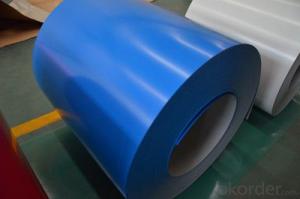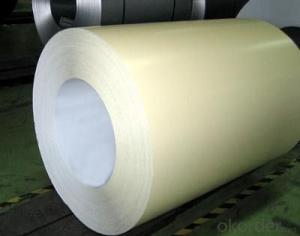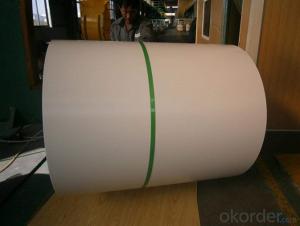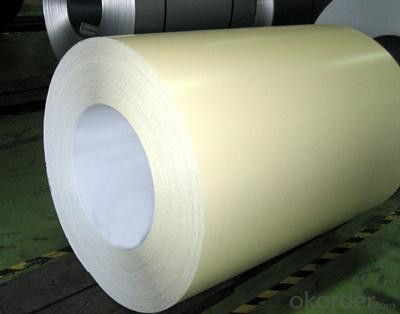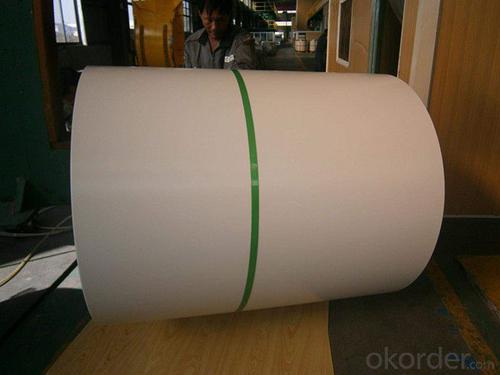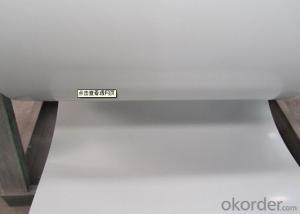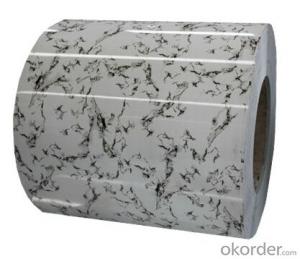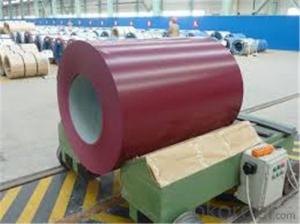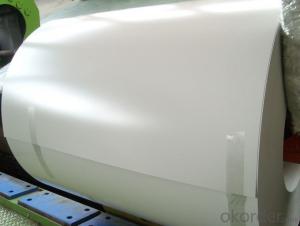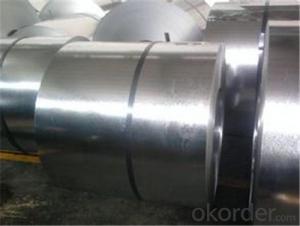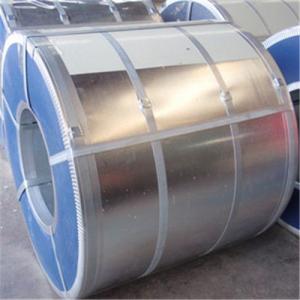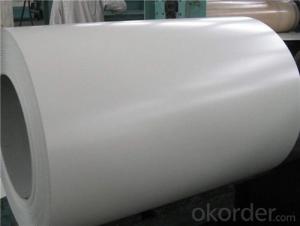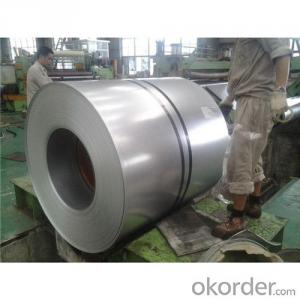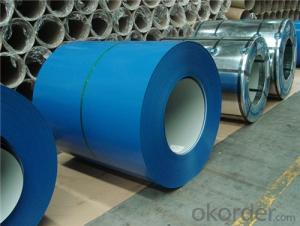Prepainted rolled steel Coil for Construction Roofing use
- Loading Port:
- Shanghai
- Payment Terms:
- TT OR LC
- Min Order Qty:
- 50 m.t.
- Supply Capability:
- 30000 m.t./month
OKorder Service Pledge
OKorder Financial Service
You Might Also Like
Structure of Prepainted Rolled steel Coil for Construction Roofing
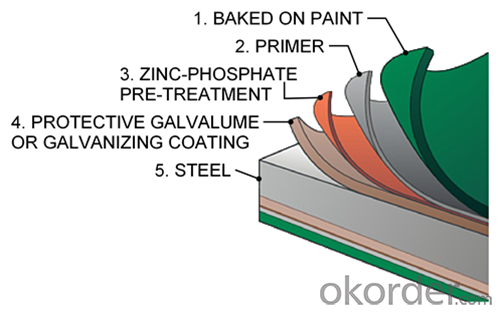
Description of Prepainted Rolled steel Coil for Construction Roofing
Prepainted Rolled steel Coil is a kind of coated steel coil/sheet. With the cold rolled steel of different strength and thickness as substrate, it is produced through applying Al-Zn coat on both faces by hot dip process. In its coating, Al accounts for about 55%, Si 1.6%, while the remaining is Zn. Aluminum zinc coils enjoys both the physical protective feature and durability of Al and the electrochemical protective property of Zn. And its surface has bright silver color and regular embossed-like figure, which are highly decorative.
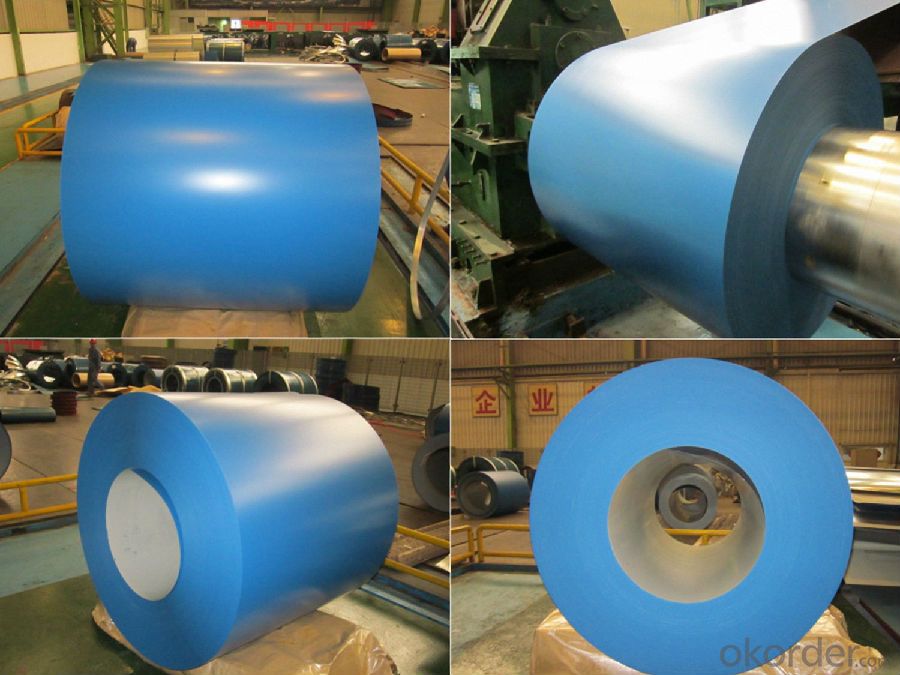
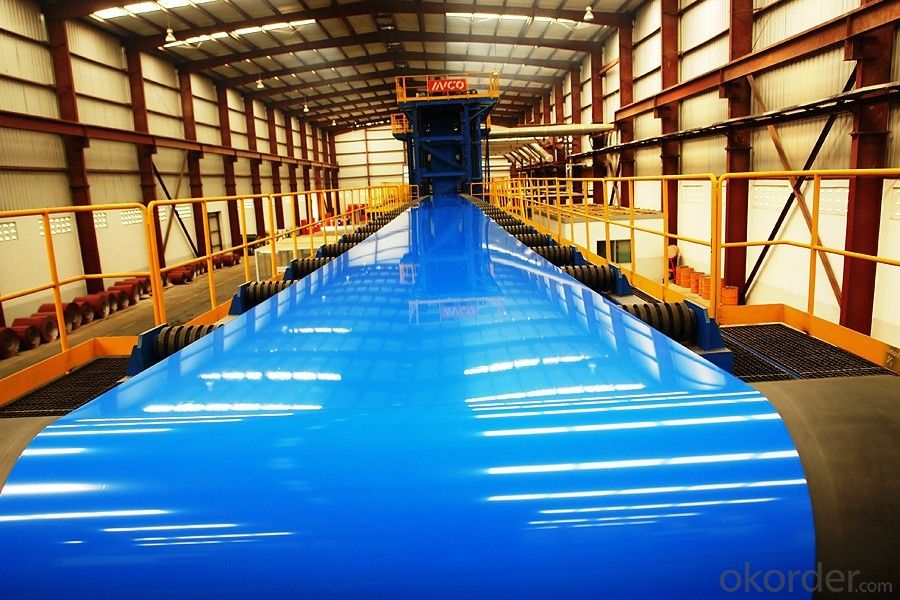
Main Feature of Prepainted Rolled steel Coil for Construction Roofing
1.Corrosion resistance: It mainly depends on the aluminum protection. When the zinc being worn, the aluminum will form a dense layer of aluminum oxide, resist corrosion material to prevent further corrosion inside.
2. Heat resistance: Aluminum zinc alloy steel sheet has excellent heat resistance, can withstand high temperatures over 300 centigrade, and is similar with aluminized steel high temperature oxidation resistance. It often used in chimney pipes, ovens, fluorescent lighting device and the device cover.
3. Heat reflective: Galvanized steel plate heat-reflective high rate is twice as galvanized steel, often used to make insulation materials.
4. Economy: Because density of 55% AL-Zn is smaller than the density of Zn, so in the same weight and thickness of Galvanized zinc layer, aluminum-zinc steel plate is larger area more than 3% of galvanized steel sheet.
Applications of Prepainted Rolled steel Coil for Construction Roofing
1. Construction and building: roofing; ventilating duct; handrail; partition panel;etc.
2. Electric appliance: refrigerator; washing machine; refrigerator; DVD;etc.
3.Transportation: oil tank; road sign; etc.
4.Agriculture:barn; etc.
5.Others:vending machine; game machine; etc.
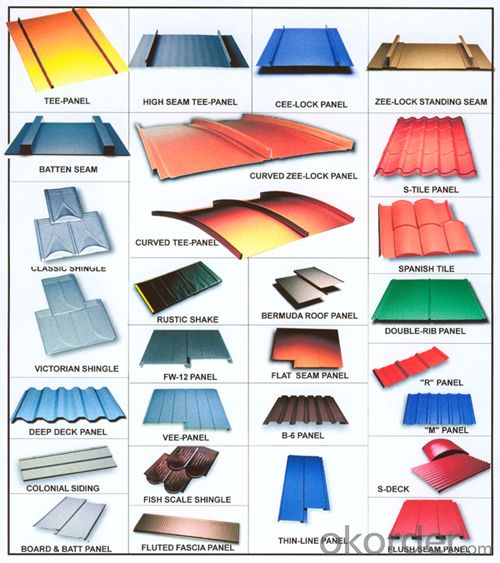
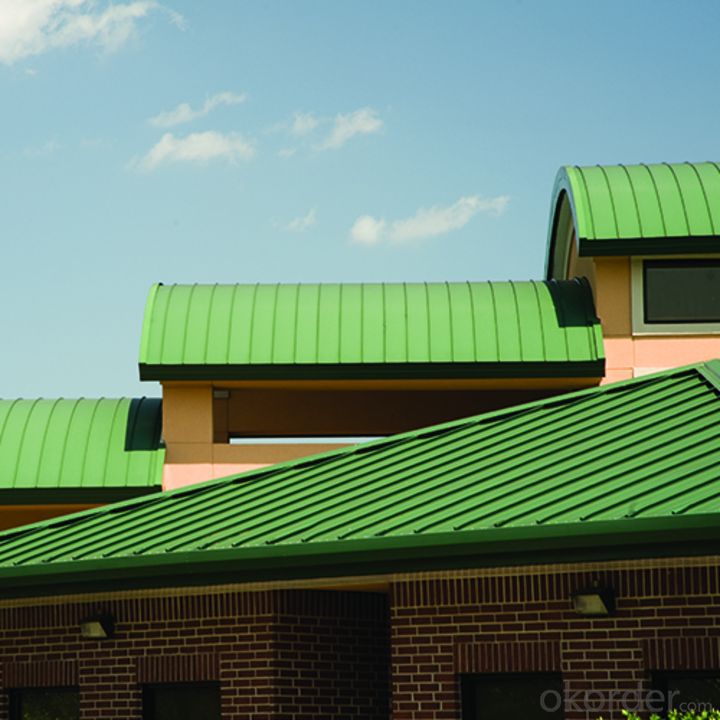
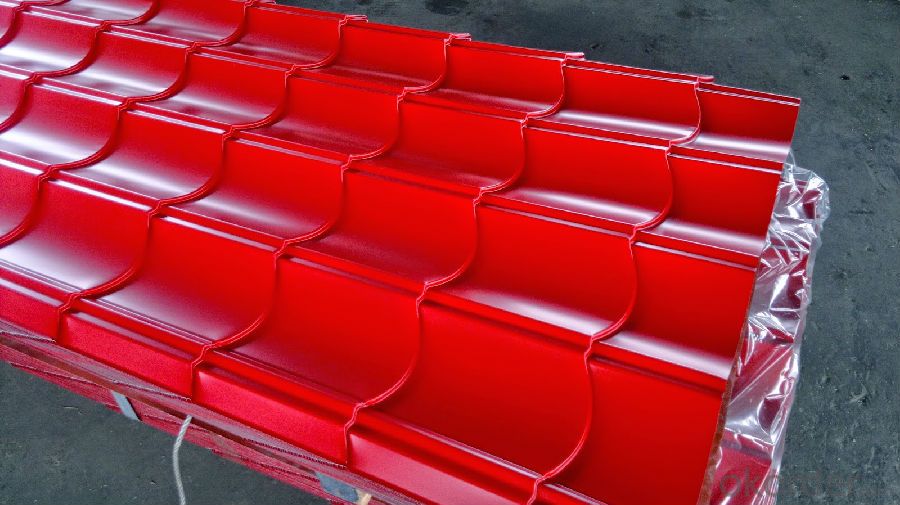
Specifications of Rolled steel Coil for Construction Roofing
Product | Prepainted Rolled steel Coil for Construction Roofing |
Material Grade | SGCC / SGCH / DX51D+AZ, etc |
Thickness | 0.2-3.0mm |
Width | 600-1500mm |
Tolerance | Thickness: +/-0.02mm , Width:+/-2mm |
Zinc-coating | AZ40-150g/m2 |
Technique | Raw material: Hot rolled steel coil --> Cold rolled_>hot dipped galvalume |
Surface | Dried, Chromated, Unoiled |
Spangle | Regular spangle , small spangle, zero spangle |
ID | 508MM |
Coil weight | 10MT max |
Export package | Cardboard inner sleeves, Waterproof paper, galvanized steel covered and steel strip packed |
FAQ of Prepainted Rolled steel Coil for Construction Roofing
We have organized several common questions for our clients,may help you sincerely:
1. What is the minimum order quantity ?
Our MOQ is 50mt for each size. And we will consider to give more discount if you make big order like 1000 tons and more. Further more, the more appropriate payment term your offer the better price we can provide.
2. How long can we receive the product after purchase?
Usually within thirty working days after receiving buyer’s advance payment or LC. We will arrange the factory manufacturing as soon as possible. The cargo readiness usually takes 15-25 days, but the shipment will depend on the vessel situation.
3. How to guarantee the quality of the products?
We have established the international advanced quality management system,every link from raw material to final product we have strict quality test;We resolutely put an end to unqualified products flowing into the market. At the same time, we will provide necessary follow-up service assurance.
- Q: How are steel coils used in the production of agricultural systems?
- Steel coils are often used in the production of agricultural systems due to their durability and strength. These coils are typically used in the construction of machinery and equipment that are essential in agricultural operations. One common application of steel coils is in the manufacturing of farming machinery such as tractors, plows, and cultivators. These machines require sturdy components to withstand the demanding conditions of the agricultural environment. Steel coils are used to fabricate the frames, chassis, and other structural parts of these machines, providing the necessary strength and support. Steel coils are also used in the production of irrigation systems, which are crucial for efficient water management in agriculture. These coils are utilized in the construction of pipes, valves, and fittings, ensuring the durability and longevity of the irrigation system. Additionally, steel coils are used to manufacture storage tanks and silos, which are essential for storing and preserving agricultural products such as grains, seeds, and fertilizers. Furthermore, steel coils find application in the construction of greenhouses and agricultural buildings. The coils are used to fabricate the structural framework, providing stability and resistance against environmental factors. Steel coils are also used in the production of fencing and enclosures to protect crops and livestock from external threats. In summary, steel coils play a vital role in the production of agricultural systems by providing the necessary strength, durability, and stability required for farming machinery, irrigation systems, storage facilities, and agricultural structures. Their usage ensures that these systems can withstand the demanding conditions of the agricultural industry and contribute to efficient and sustainable farming practices.
- Q: describe the benifits and disadvantages of the using steel as a material for fasteners
- Relatively cheap, strong, and non-toxic. For Carbon Steel alloys rust and corrosion are problems. For stainless alloys, cost becomes the problem [and corrosion is not eliminated]
- Q: I am in the US and looking for a price on wide flange steel. I need a price of one W10x30 and 20 feet long.
- The price of steel is increasing daily, so an exact answer is rough. A W10x30 is a fairly common shape and shouldn't be too hard to find. For a very rough ballpark number, say $700/ton (installed price), the piece you require should be in the range of about $250.00 or less as I assume you'll be doing the installing. Please don't take this as the gospel, however. Price varies on location, stock, and availability. Open the phone book and contact your local steel supplier. Because the piece you require is fairly short, you might get lucky and find someone who has a waste piece that length that they will give you a good deal on. --------------------------------------... I just checked the AISC web site to verify the number I quoted above and they posted an article stating that the average mill price had just increased to over $1000/ton in May. The best advice I can provide at this point is to buy the W10 now and don't wait any longer.
- Q: How are steel coils coated?
- Steel coils are coated through a process called coil coating, where the steel is cleaned, treated, and then coated with a protective layer using techniques such as roll coating or spray coating.
- Q: If you combine stainless steel with gold, does that make stainless gold?
- Nope, Stainless Steel is a tradename for a certain alloy. Regular Steel, which is formed from Ferrous Oxide (via the Bessimer Process). The stainless part is because they mixed in some other compound to give it unique qualities. Gold, on the other hand, is a pure element, and it can form alloys with other metals, but there are no guarantees what the properties will be
- Q: What are the common methods of slitting steel coils?
- There are several common methods of slitting steel coils, each with its own advantages and applications. 1. Rotary Shear Slitting: This method involves using rotary cutting knives to slit the steel coil. The coil is fed through the rotary shear machine, and the knives make simultaneous cuts along the length of the coil. Rotary shear slitting is known for its high-speed operation and ability to handle thicker gauge materials. 2. Loop Slitting: Loop slitting is a method where the steel coil is fed into a looping pit, creating a loop of material. The loop is then pulled through a set of knives that make the slits. This method is commonly used for thin gauge materials and provides precise cuts with minimal burr. 3. Drag Slitting: In drag slitting, the steel coil is fed through a set of driven rolls or drag pads, which help to maintain tension on the material. The coil is then guided through circular knives that make the slits. Drag slitting is suitable for various gauges of steel and offers good accuracy and edge quality. 4. Crush Slitting: Crush slitting involves passing the steel coil through a set of rolls, where one roll is rubber-covered and the other is hard. The rubber roll compresses the material against the hard roll, creating the slits. This method is commonly used for thin gauge or delicate materials as it minimizes the risk of edge damage. 5. Laser Slitting: Laser slitting utilizes a high-powered laser beam to make precise cuts on the steel coil. This method is highly accurate and allows for complex slitting patterns and narrow width cuts. Laser slitting is often used for high-end applications that require superior edge quality. Each of these methods has its own advantages and is chosen based on factors such as material thickness, desired edge quality, production speed, and cost considerations. It is important to carefully select the appropriate slitting method to ensure the desired outcome and efficiency in steel coil processing.
- Q: I have a steel plate 3' long x 2 wide x 3/16 thick. I have a 1/2 diameter hole with the center 3/4 from the end. Tensile strength is 38,000psi. A chain goes through the hole and is connected to a load. how does one determine how much tension the chain can have before it rips through the hole?
- oo that's a tough one. dont remember... just finished that class...sorry
- Q: I play the guitar and recently found a new type of a guitar called the steel guitar, I don't want to play it or anything it's just I've never seen anything like it before and wonder what the function of it is and what are the differences to a classical guitar
- Different okorder /. If you just like the sound, take a serious look into slide guitar, not the same, but seriously tasty.
- Q: Can steel coils be coated with impact-resistant materials?
- Yes, steel coils can be coated with impact-resistant materials. These coatings provide an additional layer of protection to the steel coils, making them more resistant to impact damage.
- Q: What are the common applications of cold-rolled stainless steel coils?
- Due to their unique characteristics and versatility, cold-rolled stainless steel coils find widespread use in various industries. The following are some common applications of these coils: 1. Automotive Industry: Manufacturing parts like exhaust systems, trim, and body panels in the automotive industry extensively utilize cold-rolled stainless steel coils. The corrosion resistance and aesthetic appeal of stainless steel make it an ideal choice for these purposes. 2. Construction Industry: The construction industry heavily relies on stainless steel coils for roofing, cladding, and structural components. The durability, strength, and resistance to corrosion of cold-rolled stainless steel coils make them a preferred material in building and infrastructure projects. 3. Kitchen Appliances: Kitchen appliances such as refrigerators, ovens, and dishwashers commonly incorporate stainless steel coils. The hygienic properties, easy maintenance, and sleek appearance of stainless steel make it popular for these applications. 4. Food Processing Industry: In the food processing industry, cold-rolled stainless steel coils are extensively used due to their non-reactive nature and resistance to corrosion. These coils are used for manufacturing equipment, storage tanks, and conveyor systems in food processing plants. 5. Medical Equipment: Cold-rolled stainless steel coils are widely employed in the medical industry for manufacturing surgical instruments, implants, and medical devices. The biocompatibility, strength, and resistance to corrosion of stainless steel make it suitable for these critical applications. 6. Oil and Gas Industry: The oil and gas industry utilizes cold-rolled stainless steel coils in various applications, including pipelines, storage tanks, and offshore platforms. The high resistance to corrosion and extreme temperature conditions make stainless steel a reliable choice in this demanding industry. 7. Aerospace Industry: Stainless steel coils find use in the aerospace industry for manufacturing aircraft components, engine parts, and structural elements. The lightweight yet high-strength properties of stainless steel make it an ideal material for these applications. In summary, cold-rolled stainless steel coils have diverse applications across industries such as automotive, construction, kitchen appliances, food processing, medical, oil and gas, and aerospace. The unique combination of durability, corrosion resistance, strength, and aesthetic appeal makes stainless steel coils a preferred choice in various industrial sectors.
Send your message to us
Prepainted rolled steel Coil for Construction Roofing use
- Loading Port:
- Shanghai
- Payment Terms:
- TT OR LC
- Min Order Qty:
- 50 m.t.
- Supply Capability:
- 30000 m.t./month
OKorder Service Pledge
OKorder Financial Service
Similar products
Hot products
Hot Searches
Related keywords
